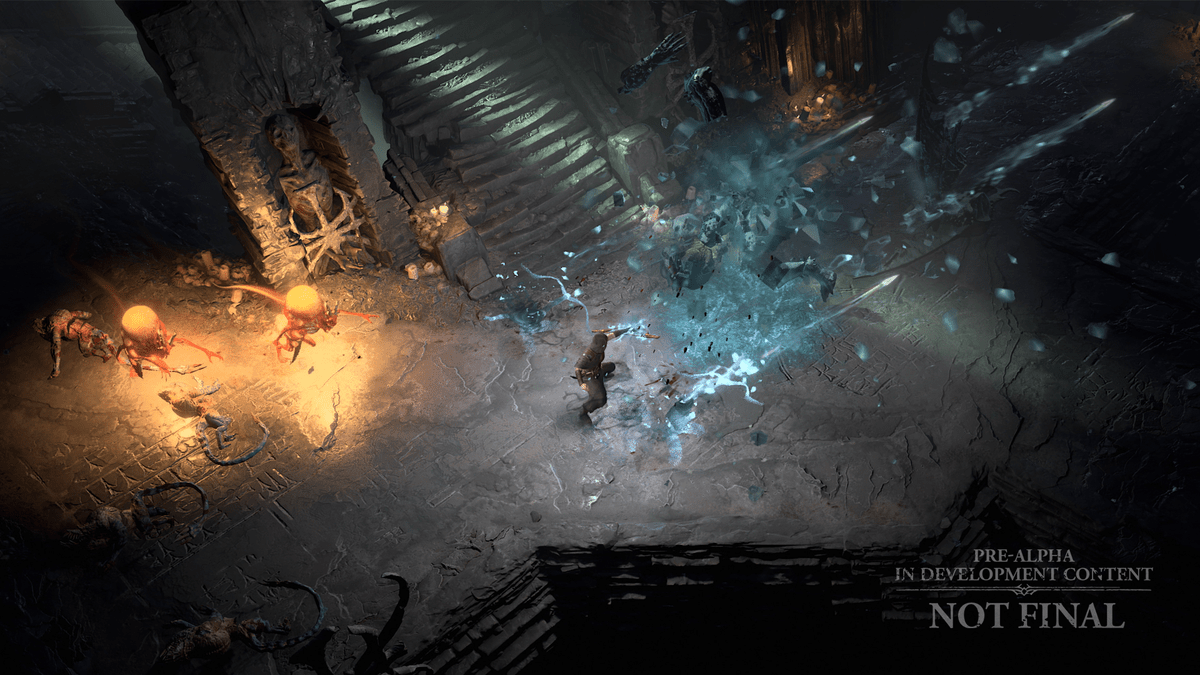Back to the basics
Diablo 4 features five playable classes for players to choose from. With a massive open-world adventure that includes many other players at once, it is essential that players pick a class that fits them best. From melee fighters to ranged magical users, here’s what you need to know to make an informed decision.
All playable classes in Diablo 4, explained
The five playable classes in Diablo 4 are as follows: Barbarian, Druid, Necromancer, Druid, Rogue, and Sorcerer. These are some of the most familiar classes from the series, harkening back to the earlier days of Diablo. But there are some changes for a few of them in this latest entry that you need to know about.
Barbarian
Barbarian returns in Diablo 4 as the main brute force melee class. This time around, the Barbarian class focuses on being a weapon master in a way. Each of its skills uses different weapon types, such as two-handed skills, bludgeon moves, and more. To this point, the idea here is to carry around several types of weapons to switch between constantly.
If you are someone who likes the idea of mastering melee gameplay and being the first one jumping into the fray, the Barbarian is for you.
Druid
The Druid returns in this game as a hybrid-style character. Players who go with this class will engage with both ranged magical spells and physical attacks alike. How it works is that the Druid is able to use nature-based spells to attack enemies from afar, but they can also turn into the spirit animals they command.
This allows them to become an eagle, deer, wolf, and snake. Each of them has different attacks, giving Druid players a nice balance between ranged and melee capabilities. If you like the flexibility of this class or the ability to shapeshift into amazing creatures, this might be the class for you. I know that this is likely to be my secondary class when the game comes out, based on how the beta version felt.
Necromancer
Necromancer has been my go-to class in this series since Diablo 2, and that is unlikely to change in this upcoming release. The idea here is to taking command of the undead, poisons, and other malevolent elements. The Necromancer is able to raise an army of the undead to fight on their behalf and overwhelm their enemies.
At the same time, they are able to cast various afflictions on enemies and damage them consistently over time. If you want to be a crowd control master, this is the class for you.
Rogue
Present since the original Diablo, the Rogue is the classic swift melee fighter. Sneaky and dexterous, the Rogue is capable of dodging attacks constantly before leaping for some hefty damage. They are quite the versatile melee class, too, offering both up-close and personal attacks, in addition to ranged maneuvers.
If you like the idea of slicing and dicing foes while also zipping around the battlefield, the Rogue might be for you.
Sorcerer
Finally, the Sorcerer is the last base class available in Diablo 4. Present throughout the entire series, the Sorcerer returns as the magical master. This spellcasting class has full command of the elements, able to use a mix of fire, lightning, and ice spells.
Players have a lot of freedom for customizing skills with this class to make it one of the most powerful area-of-effect glass cannons in the game.

Which Diablo 4 class should you pick?
Barbarian
Barbarians can choose to gain Expertise for a specific weapon type, gaining additional bonuses whenever using it like boosting damage against stunned enemies with a mace and so on.
Druid
Your Spirit Animals also allow you to gain passive Boons, which boost stats, depending on which animal you’re currently channeling. For instance, one of the Eagle’s Boons is Iron Feather, which gives you 10% more maximum life than before.
Necromancer
The Necromancer’s unique Boon system comes from sacrificing the various minion groups you have. If you choose to no longer be able to summon a particular minion during the fight, you can gain bonuses. These vary across the different groups, such as Golems and Skeletal Mages. For example, you get a 10% boost to Shadow damage in exchange for not being able to summon Skeletal Warriors.
Rogue
Rogues unlock Specializations as they level up, with different bonuses you can unlock at level 15, 25, and 30. Each of these has an associated quest you must complete before you can use these game-changing Rogue skills.
The first one you unlock is Combo Points, which is a brand new meter you’ll see fill up as you use your basic attacks. You can use up these points to make your core Rogue skills even more powerful than before.
Sorcerer
The Sorcerer has two unique Enchantment slots that unlock at levels 15 and 30, but you must do a quest for each one first. You can then put any of your magic spells into one of these slots and they will gain a massive bonus in exchange.
For example, if you enchant your Flame Shield skill, it will automatically activate to protect you from death once per 120 seconds. Meanwhile, another skill like the mastery spell, Blizzard, will automatically activate a blizzard to swarm around you every 15 seconds in battle.





